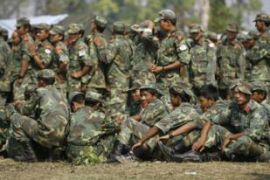Polls close in Nepal
Nepalis cast ballots to elect body to rewrite constitution amid stray violence.

| In depth | |
|
Timeline: In video: |
Maoist leaders in Kathmandu said they were investigating the report and that there was no effort under way to undermine the election.
“The need of the hour is to show restraint and have a fair and free election,” he said in a statement after meeting Girija Prasad Koirala, the prime minister.
Plot alleged
The assembly’s first tasks will be to abolish the 240-year-old Hindu monarchy and rewrite the constitution.
Gyanendra, viewed by some supporters as the incarnation of the Hindu god Vishnu, the protector, made a rare public statement.
“We call upon all adult citizens to exercise their democratic right in a free and fair environment,” he said.
| Nepal |
|
Nearly one-third of its people live on an income of less than a dollar a day Eighty per cent of Nepalis are Hindus Nepal was the world’s last Hindu kingdom before declaring itself officially secular in 2006 |
In the latest death of the campaign, one protester was killed when police opened fire on demonstrators angry at the slaying of an election candidate the previous day.
Ram Kumar Khanal, an area police chief, said the police had opened fire with live ammunition in order to disperse protesters who were smashing stores and buses.
Poll killings
A new polling date will be chosen in about a week for the constituency in Jahare Bazar town, Binod Kumar Pokhrel, an election official, was reported by The Associated Press as saying.
Voter intimidation
The United Nations, monitoring the elections and peace process, says Maoists have intimidated voters and prevented campaigning in some areas.
Other parties, it says, have also used violence and misused state machinery to influence voters.
The UN said it was “deeply shocked” by the election-related deaths, while election observers from the European Union spoke of their “deep concern” about the violence.
“Parties will trade allegations of fraud and violence. The behaviour of powerful losers will shape the immediate aftermath.”
The elections are the first since a peace deal brought Nepal‘s Maoists fighters into mainstream politics and ended a decade-long civil war in which at least 13,000 people have died.
The 27 million people of the Himalayan nation between India and China will be hoping that the election can bring peace and prosperity.
“We have no choice but to be hopeful,” Biraj Shresthra, a 43-year-old who runs a Kathmandu electronics shop, said. “We’ve seen so much fighting. Maybe now it will stop.”

